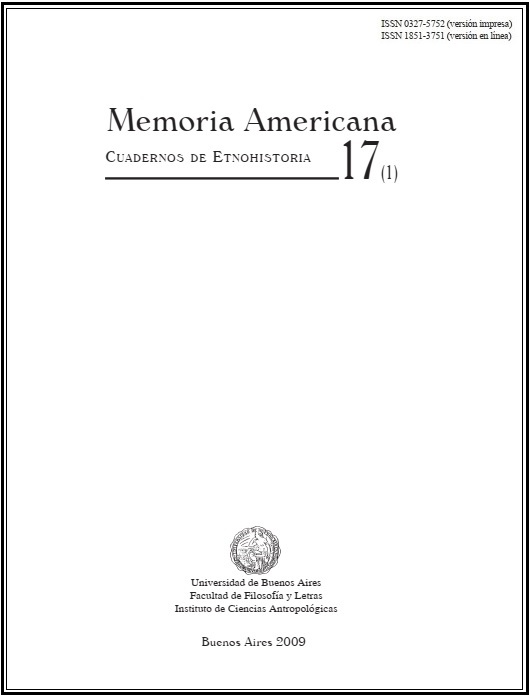Abolition and persistence of indigenous slavery in colonial Chile: pro-slavery strategies at the Araucano-Mapuche border area
Abstract
For the araucano-mapuche Indians of southern Chile captured in battle during warfare, a system of legal slavery became one of the exceptions to the juridical statute for the vassals of the King extended to includethe Indian population of America since 1542. Our work consists on a reflection on slavery and other forms of dependency and forceful work. Synthetically, we consider the illegal slavery practices which preparedthe ground to their legality since 1608, in spite of its precarious, shaky, and contradictory character, which persisted in such legislation until the beginning of the definite abolition process in 1674. Based on thefragments of histories of life, it is in our particular interest to understand how the Spaniards living in Chile intended to perpetuate slavery de facto, even once its legality became banned. Finally, after more than acentury has elapsed, we will examine how some specific women and children destinies resemble slavery practices.Downloads
References
Arenas Uriarte, Sady Ricardo 2001. La esclavitud de los aborígenes en el reino de Chile y el Padrón de Montesclaros (1613-1614). Revista del Archivo General de la Nación 22: 205-244.
Góngora de Marmolejo, Alonso de [1575] 1960. Historia de Chile desde su descubrimiento hasta el año de 1575. En Esteve Barba (ed.); Crónicas del Reino de Chile: 75-224. Madrid, Ediciones Atlas (Biblioteca de Autores españoles 131).
González de Nájera, Alonso [1614] 1971. Desengaño y reparo de la guerra de Chile. Santiago, Editorial Andrés Bello (Fuentes para la Historia de Chile).
Hanisch Espíndola, Walter 1981. Esclavitud y libertad de los indios de Chile, 1608-1696. Historia 16: 5-65.
Jara, Álvaro [1971] 1981. Guerra y Sociedad en Chile: la transformación de la guerra de Arauco y la esclavitud de los indios. Santiago, Ed. Universitaria.
Jara, Álvaro y Sonia Pinto 1982-1983. Fuentes para la historia del trabajo en el reino de Chile, 1 y 2. Legislación 1546-1810. Santiago, Editorial Andrés Bello.
Mariño de Lobera, Pedro 1960. Crónica del reino de Chile […] reducido a nuevo método y estilo por el padre Bartolomé de Escobar de la Compañía de Jesús. En Esteve Barba (ed.); Crónicas del Reino de Chile: 225-562. Madrid, Ediciones Atlas (Biblioteca de Autores españoles 131).
Obregón Iturra, Jimena Paz 2003. Rituels et conflits : Hispano-Créoles et Araucans-Mapuches dans le Chili colonial (fin du 17ème siècle). Avec l’édition critique d’actes judiciaires. Concepción 1693-1695. Tesis doctoral. Rennes, Universidad de Rennes 2 (Ms).
Quiroga, Jerónimo de [1690] 1979. Memoria de los sucesos de la guerra de Chile. Santiago, Editorial Andrés Bello.
Recopilación de leyes de los reynos de las Indias 1943 (1680). Madrid, Consejo de la hispanidad. 3 vols.
Rosales, Diego de [1670] 1910. Manifiesto apolojético de los daños de la esclavitud del reino de Chile. En Domingo Amunátegui Solar; Las encomiendas indíjenas de Chile II: 181-251. Santiago, Imprenta Cervantes.
Rosales, Diego de [1672] 1910. Dictamen sobre la esclavitud de los indígenas chilenos dirigido a la Majestad de Carlos III. En Domingo Amunátegui Solar; Las encomiendas indíjenas de Chile II: 253-272. Santiago, Imprenta Cervantes.
Rosales, Diego de [1674] 1989. Historia general de Chile: flandes indiano. T. 1 y 2. Santiago, Editorial Andrés Bello.
Sors, F. Antonio [1780] 1921-1922. Historia del Reino de Chile, situado en la América Meridional. Revista Chilena de Historia y Geografía 42, 43 (1921), 45, 46 y 48 (1922).
Sherman, William L. 1987. El trabajo forzoso en América Central, siglo XVI. Guatemala, Tipografía Nacional (Seminario de Integración Social Guatemalteca, 45).
Testart, Alain 1998a. L’esclavage comme institution. L’Homme 145: 31-69.
Testart, Alain 1998b. Pourquoi la condition de l’esclave s’améliore-t-elle en régime despotique. Revue française de Sociologie 39 (1): 3-38.
Testart, Alain 1999. Ce que merci veut dire: Esclaves et gens de rien sur la côte Nord-Ouest américaine. L’Homme 152: 9-28.
Valenzuela, Jaime 2009. Esclavos Mapuches: para una historia del secuestro y deportación de indígenas en la Colonia. En Rafael Gaune y Martín Lara (coords.); Historias de racismo y discriminación en Chile. Una mirada interdisciplinaria. Santiago, Uqbar Editores. En prensa.
Villarreal, Joaquín de [1752] 1876. Informe hecho al rey [...] sobre contener y reducir a la debida obediencia a los indios del reino de Chile. Santiago, Imprenta de la Librería del Mercurio.
Zavala, Silvio [1969] 1981. Los esclavos indios en Nueva España. México, Ed. del Colegio Nacional.
Copyright (c) 2009 Memoria Americana. Cuadernos de Etnohistoria

This work is licensed under a Creative Commons Attribution-NonCommercial-ShareAlike 4.0 International License.
Los derechos de autor son cedidos a Memoria Americana. Cuadernos de Etnohistoria, no obstante los autores podrán recuperarlos y reproducir su trabajo en otros medios o formatos previo envío de solicitud al Comité Editorial. En tales casos, deberá citarse a Memoria Americana. Cuadernos de Etnohistoria como primera publicación del trabajo y el mismo queda bajo una licencia Creative Commons CC BY NC SA 3.0 Attribution- Non Commercial -ShareAlike 3.0, la cual provee libre acceso inmediato a sus contenidos pues se rige por el principio según el cual hacer disponible -en forma gratuita- la investigación al público fomenta un mayor intercambio de conocimiento a nivel global.
Los autores deberán remitir el siguiente formulario de cesión de derechos y compromiso de originalidad:
Cesión de derechos y compromiso de originalidad
Al Comité Editorial de Memoria Americana, Cuadernos de Etnohistoria
Por la presente declaro ser el autor del trabajo titulado (nombre del artículo), el mismo es original y propio y no ha sido publicado en ningún formato o soporte con anterioridad.
En caso de ser aceptado para su publicación en Memoria Americana. Cuadernos de Etnohistoria (número/año) cedo los derechos editoriales que me corresponden por el aludido artículo para su publicación en todos los formatos que posea la mencionada revista.
Si quisiera publicar este artículo a través de otro editor o en otro lugar me comprometo a solicitar el correspondiente permiso por escrito al Comité Editorial de Memoria Americana. Cuadernos de Etnohistoria. De ser afirmativa la respuesta del Comité Editorial me comprometo a lo siguiente:
- especificar lugar, editorial y fecha de la primera publicación del artículo en la nueva publicación
- realizar esta republicación sólo luego de transcurridos un año calendario desde la fecha de la presente nota de cesión de derechos
FIRMA
Aclaración











